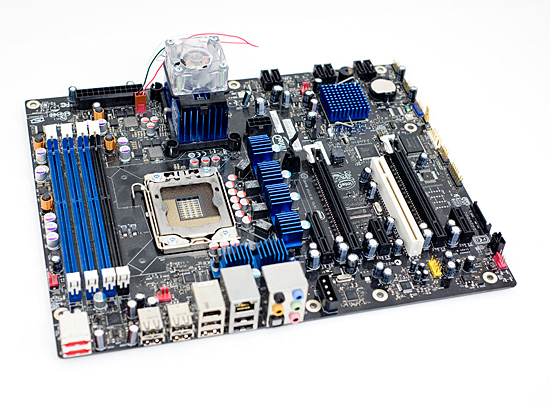Intel Core i7 980X Overclocking Update: Breaking 4GHz With 6 Cores
by Anand Lal Shimpi on March 11, 2010 9:00 PM EST- Posted in
- CPUs
So how does it feel to have the worst Core i7 980X overclocking scores online?I can't say that it's what I'm most proud of. That award would have to go to the time I wrote a review and left out the 'l' in overclocking. Needless to say after everyone pointed out how abysmal our overclocks were and after even Intel called to let us know that we should be seeing better, we gave it another shot.

Intel's DX58SO Motherboard
A motherboard swap, a little more voltage and backing off the un-core clock a bit yielded something a bit more respectable out of our Core i7 980X sample:

Keep an eye on what we're talking about here. Six cores, 12MB of L3 cache, all running at 4.13GHz with Intel's stock heatsink. With more voltage, even higher frequencies should be possible - but at the expense of increased power consumption.
The performance at 4.13GHz is even more ridiculous than the stock Core i7 980X:


Another ~17% improvement over the already bonkers 980X is just crazy. At 53.7 fps in the second pass of our encoding test we're more than twice as fast as a Core i7 920. As much as we hate that Intel is maintaining two different sockets for its desktop CPUs, the Core i7 980X makes LGA-1366 worth it. Now if Intel could only get that price down.
The performance doesn't come for free though. At 1.359V the 980X draws quite a bit more power:


The 17% performance improvement comes at the expense of a 20% increase in total system power. It's not the most efficient way to get more speed, but if for some reason you're not happy with your 980X's default performance this is the sacrifice you'll have to make.
Thanks for bearing with us as we tried to push our chip further and got some more respectable results :)










57 Comments
View All Comments
Arbie - Friday, March 12, 2010 - link
Similarly, having six cores will give little additional bang for the buck if (as on my 3.8GHz quad core system with fast hard drives) almost all of the bottlenecks are in disk I/O. Some video encoding and scientific apps will go a lot quicker with this chip, but gamers / enthusiasts will be much better off planning for the move to SSDs. For us, CPU speeds and especially number of cores are no longer the limiting factors on overall performance. Even graphics cards are ahead of the curve. Now it's disks - which is one reason why the excellent Anandtech columns on SSDs are becoming my favorite reads.Jalek99 - Thursday, March 11, 2010 - link
LMAOThanks for keeping up with the hardware reviews, I seem to be finding less of them these days.
formulav8 - Friday, March 12, 2010 - link
I laughed when I read that Intel told him he's not doing something right. They were like: we specificially hand tuned and binned these review chips to show us in the best light possible. So your definitely doing something wrong Anand!Hauk - Thursday, March 11, 2010 - link
Much better! Faith in AT's overclocking ability restored..RaistlinZ - Friday, March 12, 2010 - link
Anand,WHY are you overclocking with the stock cooler?? Your results are still the worst on the web, sadly. 4.1Ghz is nothing to brag about. Surely you have some other HSF lying around you could really test with.
Arkive - Friday, March 12, 2010 - link
Because not everyone uses the same aftermarket cooler. However, there's a good chance that every cooler somoene might use has been reviewed and compared to it's stock counterpart. With that information in tow you have a good idea (regardless of CPU) what type of performance gain you can achieve with this CPU and your cooler of choice.
Oliver55 - Thursday, August 26, 2010 - link
Hi, newbie in every O.C/non O.C sense.I heard before that having a number of cores, say 2, doesn't mean you can guesstimate its speed, say 2GHz is going to be similar to a 2x2=4GHz single core. I'm sure it can get complicated with "architecture differences" (I use that term with the tiniest level of understanding about what it is), but if you consider I'm a layman looking initially for a simple bitesize digestible tidbit, can you approximate what kind of relative proportion of speed you may expect?
For example, a dual core 2GHz may be expected to reach around what? 90% 80% 70% 60%? the speed of a single 4GHz core (other factors being similar)? Perhaps I could crudely call that efficiency.
And, having answered that question with dual cores, when you start increasing to 6, 8, or more cores, does the "efficiency" stay about the same, improve, or get worse generally speaking? And finally, is it possible to apply some kind of simplified crude equation or fraction to very roughly approximate the relationship between core number and "efficiency"?
If any of my 2ish long questions made any sense, thanks for any answers.